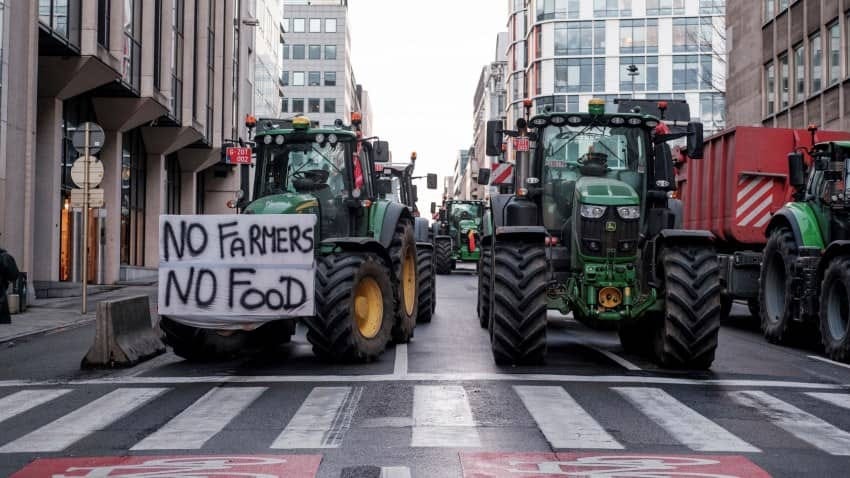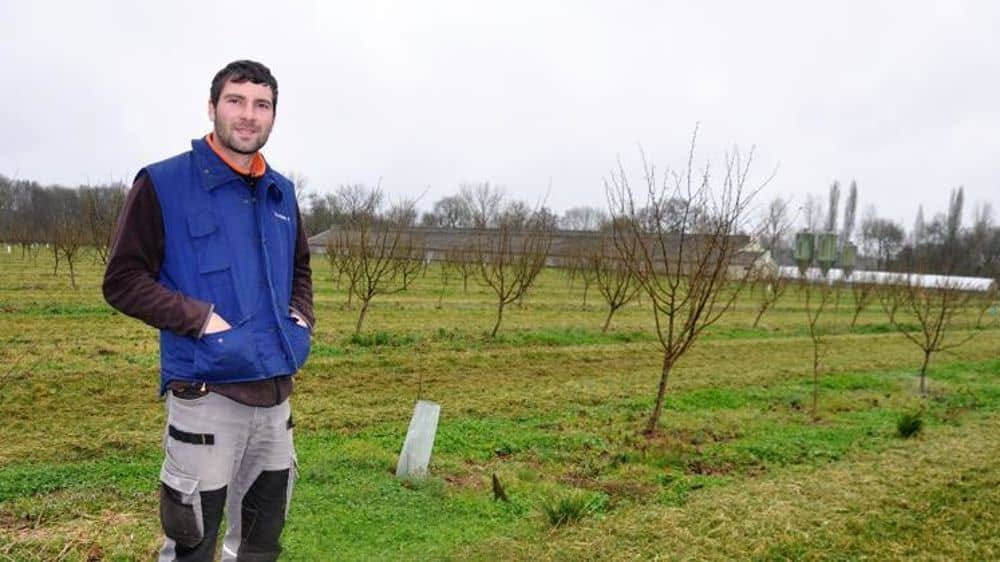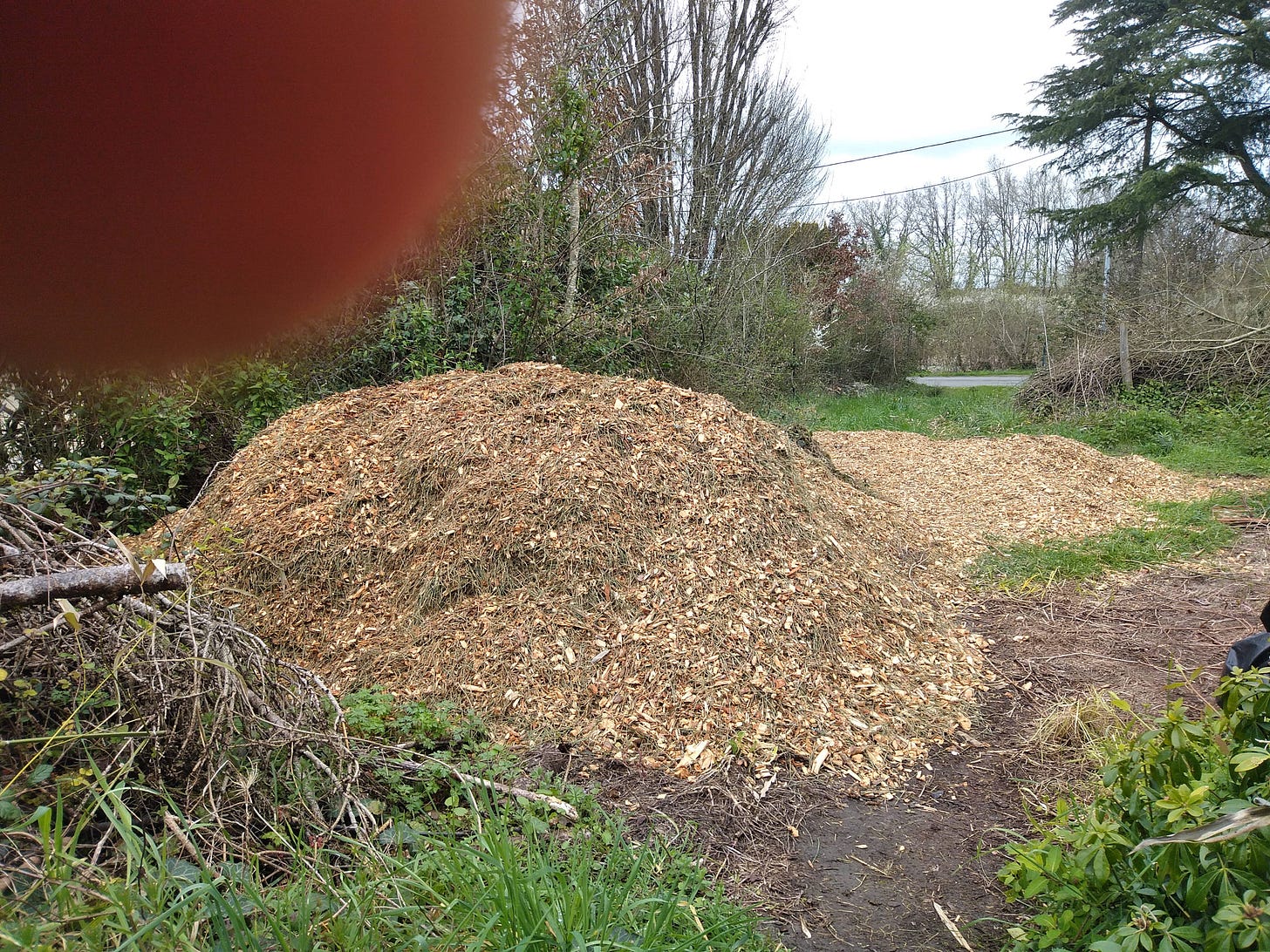Noticed tractors blocking roads? Piles of manure outside supermarkets? If you haven’t, I don’t know where you’ve been. Because the farmers’ protests have been everywhere.
They’ve even been in my little town, where nothing ever happens. With all this action on my doorstep, I just had to see what was up.
This week, we’ll be exploring:
What farmers are demanding
Why their demands (kind of) make sense
How governments have responded
What 2 real-life farmers think
And why the solution is, as always, in our hands

What do farmers want?
Farmers across Europe are angry. Angry enough to block roads, trash property and even face arrest. What do they want? Lots of different things, as it turns out. Certain demands, however, keep cropping up. According to the FNSEA, the big farmers’ union in France, French farmers want:
Recognition for their work
Fair prices for their produce
The means to do their job correctly
Fair enough. Can’t argue with that.
But dig a little deeper into the French union’s full list of demands. Turns out it’s a mix-mash of the sensible, the nonsensical, and the creepy.
First, the sensible:
fair farm-gate prices
payment of all overdue CAP payments
compo for lost revenue due to disease and climate change
a ban on imports and international trade deals that flood the market with cheap, poor quality produce
Then the nonsensical. They refuse to:
reduce pesticides
protect wetlands
limit the use of pesticides near homes, waterways and other sensitive areas
reduce pollutants from intensive poultry and pig farms
leave 4% of land fallow for biodiversity
So they want compo for climate change – but won’t do anything to mitigate climate change. And they call politicians short-sighted. 🫠
And then the creepy:
Overturn a decision that prevents the French government from going back on environmental measures
Strip the French Biodiversity Agency of its power to fine farmers who breach environmental rules
Strip the French Agency for Food, Environmental and Occupational Health & Safety of its independence.
In other words, undo environmental progress via the ballot box, bully biodiversity officers into silence, and muzzle pesky scientists with their, you know, facts and stuff.
And how have politicians responded?
Just as you’d expect elected officials to respond to the kind of discontent that could cost them their jobs. In a nutshell, governments have shelved environmental requirements and held off on fuel taxes to appease the farmers.
Times are hard for farmers, they say, what with climate change and free-market capitalism. So lets throw them a carrot and call off the new Green Deal for now.
I’m tempted to express a very strong opinion. I won’t. My position on the farmers’ protests is well known to anyone who follows me on LinkedIn.
You deserve better than a one-sided opinion, so I went to meet 2 farmers in my town to see what they make of it all.
Clément Bonneau

Clément Bonneau is a chicken and hazelnut farmer who lives a 10-minute cycle from my home. I caught up with him to see what he thought of the farmers’ protests.
Have you protested?
No, I haven’t. I support what they’re doing, mostly. I understand their frustration. But I don’t believe in trashing things or shouting my head off.
What is the biggest problem you’re facing as a farmer?
There are 2 problems.
The first is rising costs. Taxes and expenses are crippling us. I literally can’t afford to hire help. It would ruin me. Electricity and diesel prices are through the roof. And don’t think for a second that these higher costs are reflected in farm-gate prices! Basically, our profit margins are getting squeezed.
The second problem is farming regulations. Under the new environmental rules they want to get rid of pesticides. I’m all for it, but what do we use instead? Why is it up to us to figure out how to keep our businesses going with all these new rules?
I’ll give you an example: I grow hazel trees. To keep the energy moving up into the canopy of the tree and into the fruit, you have to suppress the suckers – the offshoots that form at the base. To do this, we used to have 2 herbicides in France. Now they’ve banned one of them. The thing is, the other isn’t as effective. So how do we keep the suckers down? Do we spray more? Is there a mechanical solution? Do I need to hire in help? And how would I afford it?
Then you’ve these stupid cosmetic criteria. We used to let the chickens perch, but the weight on their breastbone created a cosmetic blemish in the final meat product. Consumers didn’t like it, so perching was banned. Now they want to reintroduce perching for the chickens’ well-being. Great! But what happens when the cosmetic blemish returns?
What do you think is causing these problems?
People used to spend half their earnings on food and clothes. Now it’s a fifth. People just don’t value what we produce.
The other issue is the middlemen – your wholesalers and distributors. Big companies at the top of the chain. They set the prices. Then everyone else scrambles to cover their costs. And you can imagine what it’s like for us at the bottom of the chain.
What hope do you see for the future?
There was a bit of hope during Covid. People didn’t feel safe in supermarkets. So they went out and met local farmers and producers, people they could buy from directly, at the farm gate, away from the crowds and the virus.
It would have been great if that had continued. People said they really enjoyed shopping this way. But then lockdown ended, people went back to work, and suddenly the supermarkets, where you can get your whole weekly shop done in one go, were too tempting to ignore.
Food co-ops might work. We have one here in our town. They’ve brought together a whole range of local producers. You can certainly get all your basic items there.
Yohann Goncalvez
Yohann Goncalvez lives 5 minutes from my home. He’s a market gardener, or paysan (literally, worker of the land.) He grows herbs and vegetables for farmers’ markets.
Have you protested?
No. The protests don’t work. There’s no unity. We should all join forces – nurses, doctors, farmers and teachers. Everyone should band together in an apolitical movement, a bit like the yellow vests.
What you get instead is farmers out protesting on Mondays, nurses on Tuesdays, train drivers on Wednesdays, teachers on Thursdays. It’s splintered. It’s fractured. It’s pointless.
Another reason I’m not protesting is that I don’t feel represented. The FNSEA’s demands are about CAP payments and fuel taxes. My small farm doesn’t qualify for CAP payments or suit heavy machinery, so the price of diesel doesn’t make much difference to me either way. The FNSEA is for the big boys. I’m just a little guy.
Where I do agree with the farmers is that we must ban imports from countries that have the same labels – organic labels and eco certs and so on – but more lenient certification criteria. It’s not fair. It’s not transparent. And it’s not helping the environment, the economy or the consumer.
Okay, there’s a big push at EU level to get rid of pesticides. And for me, that’s a good thing. But I can see where Clément is coming from. Why is it up to farmers to find the solution? Why aren’t farmers being shown the alternatives to pesticides and mechanisation?
There should be compensation, financial incentives to back up the new environmental rules. As it is, we’re just asking the farmers to take the hit for everyone else.
What is the biggest problem you’re facing as a market gardener?
A lack of recognition for my work. It’s simple: no farmer, no food. No food, no life. Doctors have long been recognised for the value of their work. When COVID hit, we realised how much we rely on nurses, teachers and waste collectors. When disaster strikes, boy are we happy to see the fire brigade or the police. Why is our work as farmers not also given the recognition it deserves?
What hope do you see for the future?
Talking to other market gardeners, most reckon they’ll give up next year if things don’t improve.
That says it all.
Support farmers and the environment?
It’s easy to give into despair. Big farmers will keep banging their fists on the negotiating table until they get more money and more freedom – and to hell with the environment. Governments will keep bowing to pressure from powerful lobbies to save their own skins.
But I promised my readers: no doom, no gloom. And I mean it. There are endless solutions out there. Here are 2:
Turn bad into good: Farmers in Ireland plough up poor land – land they don’t use – for subsidies. But in doing so, they often destroy habitats that could be left to regenerate for biodiversity, flood prevention or drought mitigation. Why not pay farmers the same subsidy not to plough the land?
Take back control: The other solution is us, the consumer. We are the market. We are the government. We are the European Union. It’s up to us to show farmers, shops and leaders what we want.
What do we want? How about good food, a clean environment and a resilient local economy? Buy directly from the producer. Think farmers’ markets, organic shops, food co-ops and bulk-buying clubs.
Or better yet, buy straight from the farm gate. Every Wednesday, I cycle to a dairy farm down the road to buy our milk for the week. I pay €1 per litre, instead of €2 in the shops. And the farmer makes €1 instead of €0.20.
That’s full-cream organic milk that’s unpasteurised and unhomogenised. For half price. And a fivefold increase in sale price for the farmer.
Everybody wins – except the middlemen!
And this month in sustainability …
Huge delivery of wood chip from a local tree surgeon. The wood chip will feed the compost or mulch the perennials, but it’s a bit raw for the veggie beds.
Should keep me wheelbarrowing well into spring.





